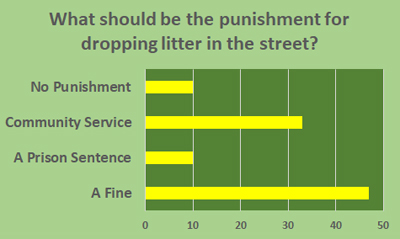Litter
How Should We Punish Littering?

Littering is a problem. Not only because it is unsightly (which it most definitely is) but also for environmental reasons. There is no doubt that we need to deter people from littering, but how? What would be a suitable punishment?
Children, as we have discovered in other surveys, are very environmentally conscious. So, for this week’s poll we decided to find out how they would deal with litter bugs. We asked 1,605 schoolchildren the following question: What should be the punishment for dropping litter in the street? We gave a choice of four possible answers ranging from very lenient to very harsh: No Punishment, Community Service, A Fine or finally A Prison Sentence.
Littering Is “Fine”
Just under half of our respondents believe that the most suitable punishment for littering would be a fine. This is in alignment with the law as it stands so the results are rare – children actually agree with the government. Results of previous polls show this is seldom the case.
Exactly one third of our respondents believe that community service would be a better punishment, and I agree with them. If we made litter bugs serve the community by picking up other people’s litter then perhaps they would be less inclined to drop their own rubbish in the future.
The options at the extreme ends of the scale, a prison sentence and no punishment at all, both received ten percent of the vote. Again, this is rather surprising as children are generally quite radical in their views. Litter seems to be the one matter on which children and adults agree.
What Is The Punishment For Littering?
At the moment the maximum penalty for littering in the United Kingdom is a fine of £2,500. That should be enough to put anybody off you would have thought, but this is rarely enforced. Local authorities employ litter wardens who have the power to hand out on the spot fines of up to £150. However, in practice these are much lower than the maximum. The average fine being about £80.
What is worse, statics show that most councils (56%) hand out less than one litter fine a week and one sixth of them issued no fines at all between April 2018 and April 2019. It is no wonder that littering is so common when culprits know the chances of them being punished are so low.
During the pandemic littering has actually increased. A survey conducted by environmental group Keep Britain Tidy found that, in the few short months between April and July 2020 local authorities were faced with an average of 57 tonnes of extra litter EACH. If you add that up, the total of extra litter in the whole of 2020 for the 404 local authorities in Britain would be 92,112 extra tonnes of litter – and that is not including the usual amounts we drop in the streets and parks of the country.
Litter Statistics
Why is litter such a problem and what can be done about it? Here are some facts that may shed some light on the situation:
- One third of us admit to dropping litter
- Litter can reduce the value of property in an area by 7%
- Over 70,000 animals are injured or killed in Britain every year by litter
- £853 million is spent cleaning up litter in England every year
- Motorists are the worst litterers. 53% of waste is found by roadsides
- The most common item of litter is the cigarette butt
- Thousands of tonnes of litter are dropped on the world’s beaches every year
- Younger people litter more than older, and men more than women
- In some US states littering can lead to prison
- Fast food packaging and drinks cans are a common type of litter
Most of us agree that littering is a problem, yet still we drop litter. The key to defeating this is for us all to take responsibility. We should stop littering ourselves, pick up any litter we come across, and report anyone we see dropping litter. Only then will littering be seen as the antisocial and anti-environmental plague that it is.
FASCINATING CHILDREN’S SURVEYSFull Results of our "Punishment For Littering” Survey
Here are the results from the 1,605 children who answered our question "What should be the punishment for dropping litter in the street?" The survey was conducted in the week ending 23rd May 2021.
| What should be the punishment for dropping litter in the street? | Percentage of Respondents |
|---|---|
| A Fine | 47% |
| A Prison Sentence | 10% |
| Community Service | 33% |
| No Punishment | 10% |



